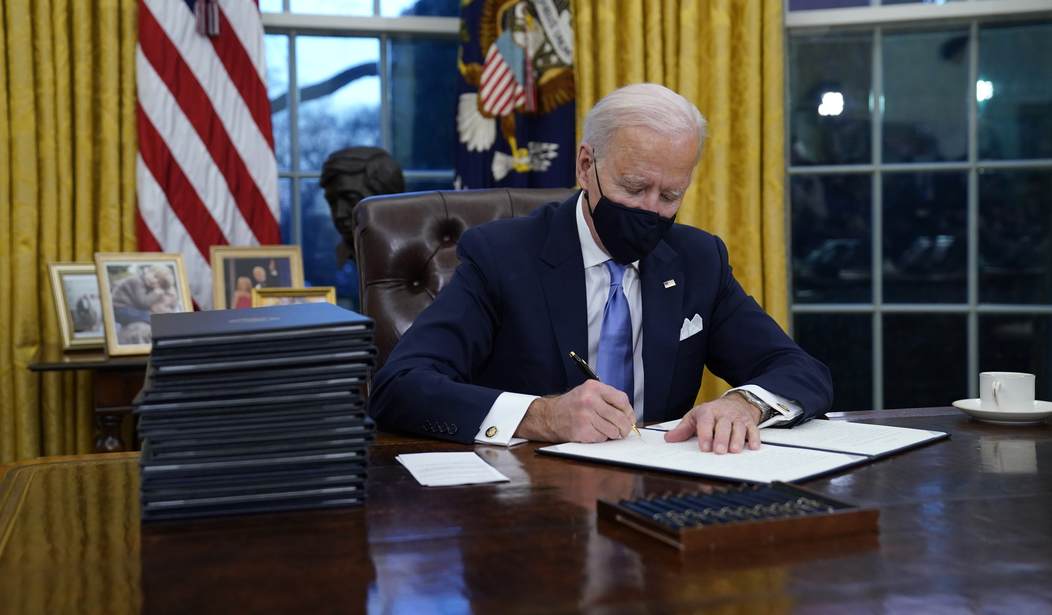President Joe Biden will issue an executive order Tuesday that raises the minimum wage for federal contract workers to a rate of $15 an hour.
Federal agencies will phase in the new higher wages for contract workers beginning in March 2022 while eliminating the separate minimum wage for tipped employees who have been paid a lower hourly wage.
President Biden is preparing to sign an executive order to increase the minimum wage to $15 an hour for hundreds of thousands of federal contractors. Workers earning the current minimum of $10.95 an hour would be getting a 37% pay hike. https://t.co/EEeMDW2fqu
— AP Politics (@AP_Politics) April 27, 2021
Rather than a nationwide statutory minimum wage hike, Tuesday's executive order only impacts federal contractors, meaning private sector employers will be spared from a direct negative impact of a higher minimum wage, but they—along with individuals—are still likely to feel the ripples of the 37% wage increase through higher taxes needed to offset the cost of increased wages.
This machination of the executive branch is Biden's only real option to deliver on some fragment of Democrats' campaign promise to raise the minimum wage in his first 100 days after earlier attempts were initially mocked and then ultimately failed amid bipartisan opposition.
The joke's on the Democrats who made the promise to fight for $15. https://t.co/XNKej1NT1f
— Townhall.com (@townhallcom) January 27, 2021
Seven years ago as an intern-reporter in DC, I covered protests by federal contractors employed at Union Station as then-President Barack Obama issued a similar edict raising the minimum wage for federal contractors to $10.10 per hour. Even in 2014, a double-digit minimum wage wasn't enough—the demonstrators I spoke with said they actually deserved $18 an hour, a rate they still won't reach with Tuesday's executive order from President Biden.
Recommended
Biden Administration officials claim that Tuesday's executive order "would not lead to reduced employment...but would enhance worker productivity and then create higher quality work by boosting workers' health, morale, and effort." Officials also claimed, according to a CNBC report, that Biden's Council of Economic Advisors think the increased cost to taxpayers would "help employers reduce turnover and lower recruitment and training costs."
Proponents of continually increasing the minimum wage have been stubborn in their efforts over the years, but so too are facts. Economic principles and real-world case studies show that a minimum wage does not actually make a society better-off, more wealthy, or more efficient. In fact, the opposite is true.
As the great Thomas Sowell explains:
Advocates of minimum wage laws often give themselves credit for being more "compassionate" towards "the poor." But they seldom bother to check what are the actual consequences of such laws.
One of the simplest and most fundamental economic principles is that people tend to buy more when the price is lower and less when the price is higher. Yet advocates of minimum wage laws seem to think that the government can raise the price of labor without reducing the amount of labor that will be hired.
When you turn from economic principles to hard facts, the case against minimum wage laws is even stronger. Countries with minimum wage laws almost invariably have higher rates of unemployment than countries without minimum wage laws.
Most nations today have minimum wage laws, but they have not always had them. Unemployment rates have been very much lower in places and times when there were no minimum wage laws.
...
There is nothing mysterious about the fact that most people start off in entry level jobs that pay much less than they will earn after they get some work experience. But, when minimum wage levels are set without regard to their initial productivity, young people are disproportionately unemployed -- priced out of jobs.
...
Unemployed young people lose not only the pay they could have earned but, at least equally important, the work experience that would enable them to earn higher rates of pay later on.
Minorities, like young people, can also be priced out of jobs. In the United States, the last year in which the black unemployment rate was lower than the white unemployment rate -- 1930 -- was also the last year when there was no federal minimum wage law. Inflation in the 1940s raised the pay of even unskilled workers above the minimum wage set in 1938. Economically, it was the same as if there were no minimum wage law by the late 1940s.
In 1948 the unemployment rate of black 16-year-old and 17-year-old males was 9.4 percent. This was a fraction of what it would become in even the most prosperous years from 1958 on, as the minimum wage was raised repeatedly to keep up with inflation.
Some "compassion" for "the poor"!

























Join the conversation as a VIP Member